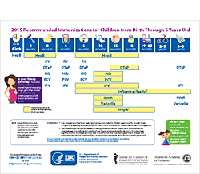Rotavirus Vaccine Safety
Rotavirus and How to Protect Against It
Rotavirus is a contagious virus that can cause gastroenteritis (inflammation of the stomach and intestines). Symptoms include severe watery diarrhea, often with vomiting, fever, and abdominal pain. Infants and young children are most likely to get rotavirus disease. They can become severely dehydrated and need to be hospitalized and can even die. You can protect against rotavirus disease with safe, effective vaccination.
Rotavirus Vaccine Side Effects
The rotavirus vaccine is very safe, and it is effective at preventing rotavirus disease. Vaccines, like any medicine, can have side effects. Most babies who get rotavirus vaccine do not have any problems with it.
Common Side Effects of Rotavirus Vaccine
- Irritability
- Mild, temporary diarrhea or vomiting
Some studies suggest that rotavirus vaccination possibly causes a small increase in the risk of intussusception, a type of bowel blockage. This side effect is very rare.
Available Rotavirus Vaccines
There are two rotavirus vaccines approved for use in the United States:
- Rotarix [PDF – 221 KB]: The Food and Drug Administration (FDA) approved this vaccine in 2008 for use in infants 6 to 24 weeks of age.
- RotaTeq [PDF – 261 KB]: FDA approved this vaccine in 2006 for use in infants 6 to 32 weeks of age
Many studies were done before the vaccines were licensed and found that they are safe.
How CDC Monitors Rotavirus Vaccine Safety
CDC and FDA continuously monitor the safety of vaccines after they are approved. If a problem is found with a vaccine, CDC and FDA will inform health officials, health care providers, and the public.
CDC uses three systems to monitor vaccine safety:
- The Vaccine Adverse Event Reporting System (VAERS) – an early warning system that helps CDC and FDA monitor problems following vaccination. Anyone can report suspected vaccine reactions and issues to VAERS.
- The Vaccine Safety Datalink (VSD) – a collaboration between CDC and several health care organizations that allows ongoing monitoring and proactive searches of vaccine-related data.
- The Clinical Immunization Safety Assessment (CISA) Project – a partnership between CDC and several medical centers that conduct clinical research on vaccine-associated health risks in certain groups of people.
A Closer Look at the Safety Data
- Studies from the United States and other countries show a small increased risk of intussusception following rotavirus vaccination. About 1 in 20,000 US infants to 1 in 100,000 US infants who get rotavirus vaccine might develop intussusception within a week of getting the vaccine. This means that between 40 and 120 U.S. infants might develop intussusception related to rotavirus vaccine each year.
More Resources
- Rotavirus Vaccine Information Statement
- Rotavirus Vaccine: Who Should Not Get Vaccinated
- Information on Rotavirus Vaccination
- CDC Feature: Protect Your Child against Severe Rotavirus
- Questions and Answers about Intussusception
Related Scientific Articles
Belongia EA, Irving SA, Shui IM, Kulldorf M, Lewis E, et al. Real-time surveillance to assess risk of intussusception and other adverse events after pentavalent bovine-derived rotavirus vaccine. Pediatr Inf Dis J. 2010 Jan;29(1):1-5.
Buttery JP, Danchin MH, Lee KJ, Carlin JB, McIntyre PB, et al. Intussusception following rotavirus vaccine administration: Post-marketing surveillance in the National Immunization Program in Australia. Vaccine. 2011 Apr 5;29(16):3061-6.
Carlin JB, Macartney KK, Lee KJ, Quinn HE, Buttery J, et al. Intussusception risk and disease prevention associated with rotavirus vaccines in Australia’s National Immunization Program. Clin Infect Dis. 2013 Nov;57(10):1427-34.
Centers for Disease Control and Prevention. Addition of history of intussusception as a contraindication for rotavirus vaccination. MMWR. 2011 Oct 21;60(41):1427.
Haber P, Patel M, Inzurieta HS, Baggs J, Gagiullo P, et al. Postlicensure monitoring of intussusception after RotaTeq vaccination in the United States, February 1, 2006, to September 25, 2007. Pediatrics. 2008 Jun;121(6):1206-12.
Haber P, Patel M, Pan Y, Baggs J, Haber M, et al. Intussusception after Rotavirus Vaccines—United States, Vaccine Adverse Event Reporting System (VAERS), 2006-2012. Pediatrics. 2013 Jun;131(6):1042-9.
Hibbs BF, Miller ER, Shimabukuro T. Notes from the field: Rotavirus vaccine administration errors- United States, 2006-2013. MMWR. 2014 Jan 31;63(4):81.
Patel MM, Haber P, Baggs J, Zuber P, Bines JE, et al. Intussusception and rotavirus vaccination: A review of the available evidence. Expert Rev Vaccines. 2009;8(11):1555-1564.
Patel MM, López-Collada VR, Bulhões MM, De Oliveira LH, Bautista Márquez A, et al. Intussusception risk and health benefits of rotavirus vaccination in Mexico and Brazil. N Engl J Med. 2011 Jun 16;364(24):2283-92.
Shui IM, Baggs J, Patel M, Parashar UD, Rett M, et al. Risk of intussusception following administration of a pentavalent rotavirus vaccine in US infants. JAMA. 2012 Feb 8;307(6):598-604.
Tate JE, Simonsen L, Viboud C, Steiner C, Patel MM, et al. Trends in intussusception hospitalizations among US infants, 1993-2004: Implications for monitoring the safety of the new rotavirus vaccination program. Pediatrics. 2008 May;121(5):e1125-32.
Weintraub ES, Baggs J, Duffy J, Vellozzi C, Belongia EA, et al. Risk of intussusception after monovalent rotavirus vaccination. N Engl J Med. 2014 Feb 6; 370(6):513-9.
Yih WK, Lieu TA, Kulldorff M, Martin D, McMahill-Walraven CN, et al. Intussusception risk after rotavirus vaccination in U.S. infants. N Engl J Med. 2014 Feb 6;370(6):503-12.
- Page last reviewed: October 27, 2015
- Page last updated: February 1, 2017
- Content Source:


 ShareCompartir
ShareCompartir
